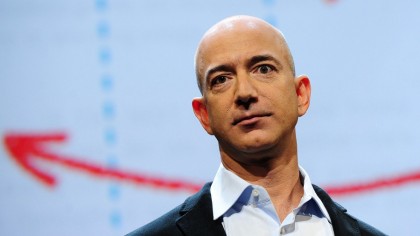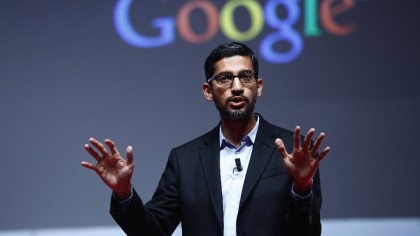Here's what's keeping CEOs at Amazon, Apple, Google and others awake at night
And by others we mean Microsoft, Intel, Twitter and Yahoo

Sign up for breaking news, reviews, opinion, top tech deals, and more.
You are now subscribed
Your newsletter sign-up was successful
Introduction
Tech companies are having a good run. Thanks to the internet, which is now used by over three billion people, the reach of Facebook, Twitter, Amazon, and so on seems endless. A teenager today can find information on a range of topics that would, just 20 or so years ago, have required multiple trips to multiple libraries – and they can do it instantly.
The internet-connected world is set to change rapidly, as the abundance of information – based, in part, on crowd-sourced knowledge – spreads exponentially.
That isn't to say that tech companies are impenetrable, of course. Many have their own flaws and weaknesses, including competition, changing macro trends, or something else entirely. In this article, we are going to examine the major challenges facing these firms, starting with a certain iPhone peddler…
- Also check out: Why does Apple keep making the Mac?
Apple

It may seem strange that the most valuable technology company in the world (current market value: $547 billion, which is around £415 billion, AU$730 billion) would be facing difficulties, but there are signs that Apple's dominant position may be under threat.
The iPhone, which is one of the most successful products ever raking in countless billions in revenue every year, has long dominated high-end smartphone sales, but as more people buy premium smartphones the addressable market – i.e. the people who haven't got one – becomes smaller.
Growth in China, where the middle class is expanding rapidly, has dropped off a little, which is making investors nervous.
Apple has recently been touting its software and services business – the subscription stuff that comes with an iPhone – as an alternative path, but it remains to be seen if that can compensate for the slowdown in phone sales.
Sign up to the TechRadar Pro newsletter to get all the top news, opinion, features and guidance your business needs to succeed!
Microsoft

Microsoft is a dominant force for many users when it comes to Windows, Office, and so on – but only on a PC at work. A near-catastrophic failure to enter the smartphone market in any meaningful way has left Microsoft out in the cold when it comes to the devices consumers use most, which has degraded its market position and influence substantially.
Changes by Satya Nadella, the third CEO of the company in 40 years, have yielded some progress and the online services division, which includes Office 365, is promising.
The biggest problem that Microsoft faces is what course it should take next. Does it, for example, retreat to an enterprise-only entity that licenses computing power to other companies? Or will Windows 10, which has over 350 million active users, help it remain relevant inside the home?
Microsoft recently backed away from its goal of one billion Windows 10 devices by 2018 – thanks, the company says, to a focus on mobile – and this only stands to reinforce the idea that, for consumers outside the workplace, Microsoft is no longer relevant.
Amazon

Amazon is hot stuff at the minute, thanks to its Amazon Web Services (AWS) division and massive e-commerce business. The company has crushed its competitors online and is well on the way to taking over from Walmart as the foremost way of shopping in the US.
Of all the companies on this list, Amazon is in the strongest position insofar as it dominates almost every market it enters: e-commerce, cloud services, e-readers, and so on. But there are areas that could be improved, such as online multimedia, and complacency from being at the top could force an error.
Microsoft, and smaller companies like Box, are champing at the bit when it comes to cloud services, and Amazon could become a victim of the same internet-based 'disruption' that it rained down on bricks-and-mortar retailers.

Google, one of the original internet giants, is in an odd position. For a decade or so it was the undisputed king of the internet and, because of that, advertisers pumped endless dollars into the firm.
These days, however, Google is suffering from issues on multiple fronts. Facebook is cutting (deeply) into Google's revenue streams as the social network emerges as a compelling way of reaching a large online audience.
Google was also slow to monetise its online platform for mobile. This was, in part, thanks to Apple's dominance of high-end mobile phones and its subsequent unshackling from Google services, including search. The company still has Android, of course, but the most affluent – and thus desirable – users own an iPhone.
Cloud services are another area in which Google is struggling, despite being one of the first cloud companies. Amazon has essentially done what Google should have, and Microsoft owns the lion's share of the most lucrative deals, leaving the search giant with little else.
Google still has a long runway before bad things start happening, but the rosy situation the company found itself in pre-2010 is no longer a reality.

Twitter, like Google, is a victim of Facebook's success and the unwillingness of advertisers to spread cash to a much smaller social network.
User growth for Twitter has stalled at around 310 million users per month worldwide, which may seem impressive but pales into comparison when you consider that over one billion people use Facebook every day. (The comparative daily use figure for Twitter, while unconfirmed, reportedly sits at around 150 million.)
Product innovation has also stalled at Twitter, which often leads from the front with new ideas and products – live streaming (Periscope), short videos (Vine), real-time breaking news (on Twitter itself) – only to be surpassed by Facebook, which leverages its massive user base to muscle out its smaller rival.
Harassment is also an issue for Twitter, which has been slow to deal with reports of offensive comments towards women, minorities, and so forth, which have led many to consider the network a hostile environment that isn't worth bothering with.
The combination of issues – Facebook's dominance, a slow product development cadence, and problems with trolling and harassment – present Twitter with a series of high-level flaws that have not yet been fixed, despite many statements by top executives about imminent changes.
Intel

Intel has been around for a long time and is responsible for a lot of innovation that has happened in the tech world thanks to its founders – one of whom thought up Moore's Law.
Times have changed, however, and Intel missed out on the mobile revolution which has seen PCs become far less relevant to the everyday consumer when compared to a smartphone.
Qualcomm, a newer rival to Intel, positioned itself quickly and effectively as the go-to maker of smartphone chips, and Apple develops the iPhone's processor in-house, which left Intel bereft of billions in potential revenue.
Intel recently shifted its focus to work on Internet of Things devices, which are an emerging market that could pay dividends – if the IoT matches expectations over the next few years. But the loss of smartphone revenue has left the company in a tricky position that would have been impossible 10 or 20 years ago.
Yahoo

Yahoo, which is the oldest internet giant, has gone through a rough patch in recent times – by which we mean the past 10 years – as social networks surpassed it as the main way to access consumer news and other media.
The homepage, which more closely resembles a newspaper than Facebook's timeline, is still visited by around a billion people per month, but advertisers are moving towards the social networks to invest, leaving Yahoo short.
Deals to make Yahoo into a technology company, which receive a higher valuation from investors compared to media companies, have remained unsuccessful and multiple acquisitions of startups – including Tumblr – have failed to drive relevance or growth.
The company recently put itself up for sale, with bidders reportedly including Verizon and some private equity firms. The outcome of any impending deal is of course not known, but will most likely relegate the company to a position within a conglomerate that is bundled with other media outlets.
Having a homepage visited by over one billion people is, however, a definite asset, and a focus on this over the tech side of things – with the exception of Yahoo Mail, which is used by around 300 million people – could breathe new life into a failing giant.
Max Slater-Robins has been writing about technology for nearly a decade at various outlets, covering the rise of the technology giants, trends in enterprise and SaaS companies, and much more besides. Originally from Suffolk, he currently lives in London and likes a good night out and walks in the countryside.